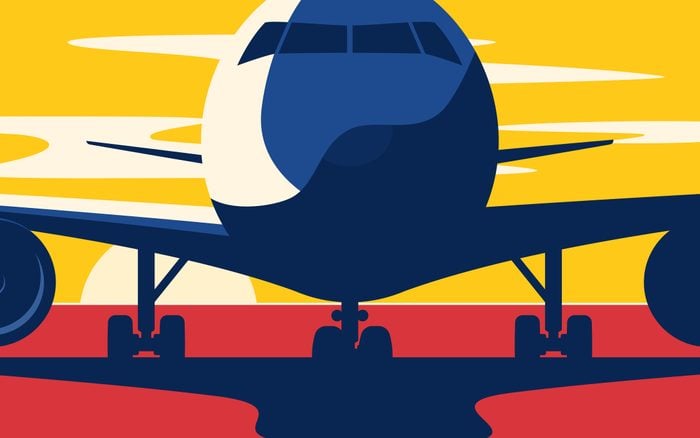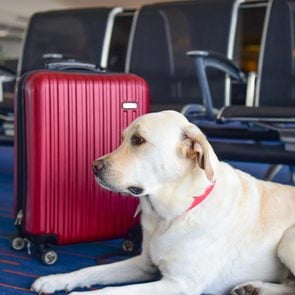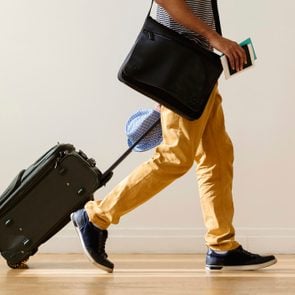These Are the Best Flights to Avoid Cancellations and Delays
Updated: Feb. 01, 2024

Is there a way to increase the likelihood that your flight actually leaves on time? Yes, and it entails knowing when to book the best flights.
There’s more to finding the best flights than knowing when to buy plane tickets to get the best airfare. If you want a smooth trip, you also need to know the best time of day to fly. That’s more important than ever, thanks to a combination of staffing shortages, oversold flights and increased demand for travel post-COVID, not to mention weather issues and more, causing delays and cancellations by the thousands.
The numbers are enough to make you want to stay home: 58% of flights were late in the first four months of the year, according to Bloomberg, which called the problems part of a “COVID hangover.” The Department of Transportation reported that 6.3% of flights were canceled in January, followed by 4.5% in February. And already, more flights were canceled by June 2022 than in all of 2021. “There’s a domino effect of delays now,” says Karen Villano, a gate agent with a major airline and a blogger for the travel site I Fly Right.
But don’t get discouraged. There are certain flights every day that are less likely to get off-track—and that makes them the best flights, in our opinion. We talked to travel experts to find out the best flights to take at every time of the year, including the holidays, and how to get the best deals on them, as well as what you need to know about connecting flights to minimize potential problems. If, however, things still go awry, make sure you know this info about how to get a refund if your flight is canceled.
Which flights are least likely to get canceled or delayed?
The first flight of the day is the best time to fly to avoid cancellations and delays, even at the busiest airports in the world. That’s because the plane and crew likely arrived the previous night and are already on site. “You don’t need to wait on the plane arriving from another city, which may be delayed due to a host of factors, including weather,” explains Suzanne Wolko, a travel blogger with Phila Travel Girl.
And we can get even more specific: If possible, choose a flight that leaves before 8 a.m., as these flights are statistically the least likely to experience delays or cancellations, says Nick Mueller, director of operations at HawaiianIslands.com.
Do the same rules apply for international flights?
You may not have as many options when selecting the time of your international flight, but if possible, take the earliest flight for the same reasons listed above. And here’s another important tip: For international flights leaving from the United States with more than one stop, take the longest flight first, regardless of whether it’s early or later in the day.
There are two reasons for this, says Justin Hill, founder of Faretrotter, a flight-comparison site. First, European Union regulations apply to flights that take off and land in the EU, so if your flight is late departing the United States, the airline will be liable for reimbursing each passenger for the delays. “This liability is much higher for the EU than in the U.S., so there is a higher incentive for airlines to prioritize these long-haul flights first,” Hill says. Translation: They’re less likely to be delayed.
Second, once you make it to your destination, there are usually more alternative transportation options. So if something happens along the way, there’s still a good chance you’ll arrive at your destination at a reasonable time. Also, here’s what you need to know about leaving the airport during layovers.
What flights are most likely to get canceled or delayed?
Delays tend to build until they reach their peak at about 6 p.m., Mueller says, so avoid those late-afternoon and evening flights whenever possible. That also applies to connecting flights. While these flights don’t necessarily have an increased chance of getting canceled or delayed on their own, all flights affect one another. If you can, book a nonstop flight, since every connection increases the risk of delays and cancellations.
Do some flights have more delays or cancellations than others?
Yes! In fact, many airlines will tell you how frequently each flight is canceled or delayed—by the route and time of day—which is very helpful when choosing your flights, says Margie Jordan, owner of Jordan Executive Travel Service in Jacksonville, Florida. Google Flights also provides this information, if the airline doesn’t. Here’s an easy trick to predict if your flight will be delayed.
“There are also apps like Flightly, which is my favorite, that give you a history of the places the plane you’re traveling on has been, and if it’s been late,” Jordan says. “With Flighty, you’ll know more than you thought you needed to know about your upcoming flight.” Talk about essential airplane facts!
When should you book to get the best flights?
Book four to six weeks in advance for the best rates on the best flights. “When this time frame opens, there are generally enough bookings—or lack thereof—where airlines may start issuing discounts on some routes, but not enough bookings to start seeing airfare skyrocket, like you see the day before a flight,” Hill explains.
Also try to buy flights on Tuesdays or Wednesdays. According to Shane Mahoney, the founder of Lugos Travel, most of the primary airlines will post their pricing updates on Tuesdays, while secondary airlines will adjust their pricing on Wednesdays. The worst day to book? Sunday. That’s when most people sit down to plan their vacations, so you’ll have the most competition for the best flights, and prices will be at their highest.
Are there exceptions for holiday travel?
Whether you’re traveling internationally or domestically, it’s especially important to take an early flight during holiday travel. Airlines tend to be overbooked at this time of the year, so if your flight is canceled or delayed, it will be incredibly difficult to get onto a new flight and you’ll want as much wiggle room as possible, Mueller says.
You’ll also want to book as early as possible—as early as June or July—for the best prices. That said, you can still get a deal later, though you run the risk of not getting your preferred flight. “I view Halloween as the cutoff date for getting a reasonable price on a Thanksgiving flight, but aim to get booked by late August or early September,” says Phil Dengler, co-owner of The Vacationer. “After Halloween, prices will increase considerably as Thanksgiving gets closer.” The same goes for Christmas flights.
And remember: Most international countries aren’t vacationing during Thanksgiving week, Wolko notes. Because of that, those fares are often less pricey than they would be for Christmas break, so you may want to reconsider your holiday travel plans.
Sources:
- Bloomberg: “Wave of Airline Flight Delays This Year Mostly Self-Inflicted”
- Department of Transportation: “Air Travel Consumer Report”
- Karen Villano, gate agent with a major airline and blogger for I Fly Right
- Suzanne Wolko, travel blogger with Phila Travel Girl
- Nick Mueller, director of operations at HawaiianIslands.com
- Justin Hill, founder of Faretrotter
- Margie Jordan, owner of Jordan Executive Travel Service
- Shane Mahoney, founder of Lugos Travel
- Phil Dengler, co-owner of The Vacationer



